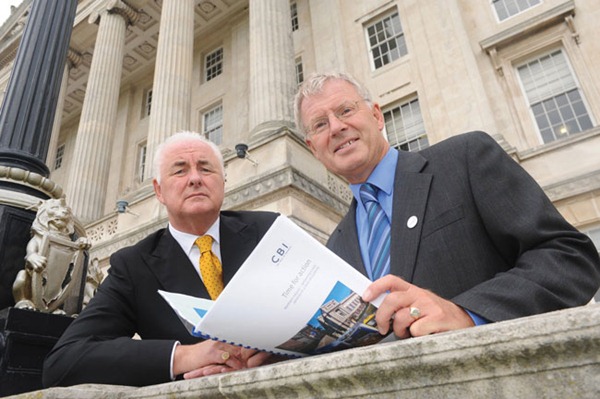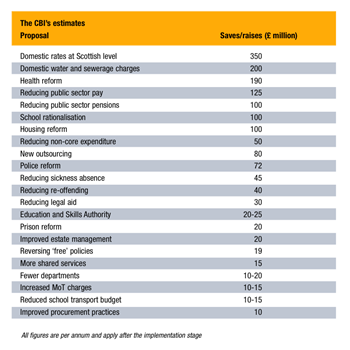Filling the funding gap
agendaNi considers the CBI’s plans for cutting spending and raising money, to fill Northern Ireland’s expected funding gap.
Businesses have already ‘taken the hit’ in the recession and it is now time for the public sector to cut its costs, according to the CBI.
Its pre-spending review report, ‘Time for action: Northern Ireland – delivering public services in a time of austerity’ predicts the UK Government to take between £1.6 billion and £2.0 billion out of the public sector over five years. For context, the June Budget estimated that the block grant for 2009-2010 was £11.2 billion.
Highlighting a “massive imbalance” between the two sectors, the CBI says that simply “growing the private sector” was a “misleading mantra” which would not solve the problem.
Its alternative is a “fundamental and complete restructuring” of public services, which will mean “painful reductions” in staff and some services. The report’s key message to government is to be “bold about reform”. A preferred balance of £1.1 billion savings to £400 million raised from new sources is set forward.
Reform
Freezing public sector pay and cutting back on overtime is the CBI’s first demand. About half of public spending goes on labour costs and public sector employees earn 27 per cent more than they would in business. Job losses are inevitable but some can be prevented by renegotiating pay deals and pensions.
The CBI also highlights four areas for “re-engineering” i.e. improving services while cutting costs: health, housing, education and justice.
Rather than ring-fencing health, the CBI says that £190 million can be saved in that budget. It proposes a “rationalisation” of the health estate (i.e. closing or merging some facilities), improved GP services to reduce A&E admissions, and more services at home or in the community. Thirty per cent of hospital patients do not need to be there, it claims.
While praising the Housing Executive’s track record, the report estimates that £100 million can be saved from its budget. The Housing Commission’s proposal for a separate ‘housing delivery body’ is supported. Modest rent increases could help fund a comprehensive energy efficiency programme, thus reducing costs in the longer term.
Too much education spending is “consumed” by administration and “unnecessary” infrastructure rather than spent on teaching. The Education and Skills Authority is “urgently required” and closing or merging schools would decrease the number of empty desks, currently recorded at 54,000.
Involving the private sector in redeveloping Maghaberry prison is also proposed, with the CBI pointing to the lower costs of private sector-run prisons elsewhere. There are 13 private prisons in Great Britain. All prisons on Ireland are state-controlled.
Reducing the number of departments (currently 12 plus the NIO) could save £10-20 million and also improve government’s effectiveness. Overall, the CBI wants fewer but better trained managers. As in business, high performers must be “consistently recognised and rewarded” and poor performers “effectively managed”.
Private input
An expansion of outsourced shared services is suggested but the main, and most controversial, proposal is to turn several public services into markets. The Executive “must take a more positive and aggressive approach to outsourcing” in these areas:
• custody services;
• debt collection;
• health and social care;
• printing and document design; and
• utility asset management.
Public sector procurement bodies must be streamlined, it adds, along with sales of surplus government property. Public services should also share offices, the CBI suggests.
Income
The CBI’s most direct criticism of the Executive is against “populist” policies which have cut income e.g. free prescriptions, free transport for the over 60s. Reversing these could save £19 million for core public services.
Northern Ireland households also pay “significantly less” for some services than those in Great Britain. To raise more money, the CBI reluctantly proposes:
• An increase in domestic rates and MoT charges;
• Introducing domestic water and sewerage charges;
• Congestion charging or tolling;
• Bringing in charges for freedom of information requests, planning application queries and museum admissions.
Failure to restructure public services, it warns, would leave a larger funding gap to be filled with “more radical” proposals. Controversially, these would involve means-tested charging for some medical services (e.g. A&E admissions or out-of-hours GP advice).
The private sector, it says, could run urban car parks and MoT centres. Mutualisation of Northern Ireland Water is also proposed.
The CBI calls on the Executive to produce a four-year plan by the end of November to carry out these recommendations. This would contain a long-term commitment to open up “public service markets” and set out clearly how public services are to be re-engineered and restructured.
A decision on the size and shape of government departments must also be taken before the next Assembly elections, it adds. To cover implementation costs, the CBI suggests a restructuring fund provided by the UK Government.
CBI Chairman Terence Brannigan accepts that the report is “not flawless” but hopes it will stimulate debate rather than “self-serving point-scoring”.
Trade unions were strongly critical, dismissing the proposals as “an ideological flight from … reality”. ICTU Assistant General Secretary Peter Bunting explained that one in three private sector businesses in Northern Ireland depend on contracts from the public sector.
He also saw nothing new in most of the proposals and claimed the real pay gap for local private sector employees was with their counterparts in Great Britain.
“If they got their way, and public sector wages were slashed, what would happen to the local shops and hairdressers and builders if millions of consumer spending is removed from the economy?” he stated.
The report, though, was generally welcomed by the DUP and Alliance. DUP MLA Simon Hamilton also wants to see fewer departments but called for security and infrastructure spending to be protected.
Alliance’s Stephen Farry remarked that “continued populism is unsustainable and harms public services and economic recovery.” He added that employers and unions must also “get around the table” to work out solutions.
Farry warned: “There is no point in any politicians maintaining a state of denial.”
The full report can be read at www.cbi.org.uk/ni







